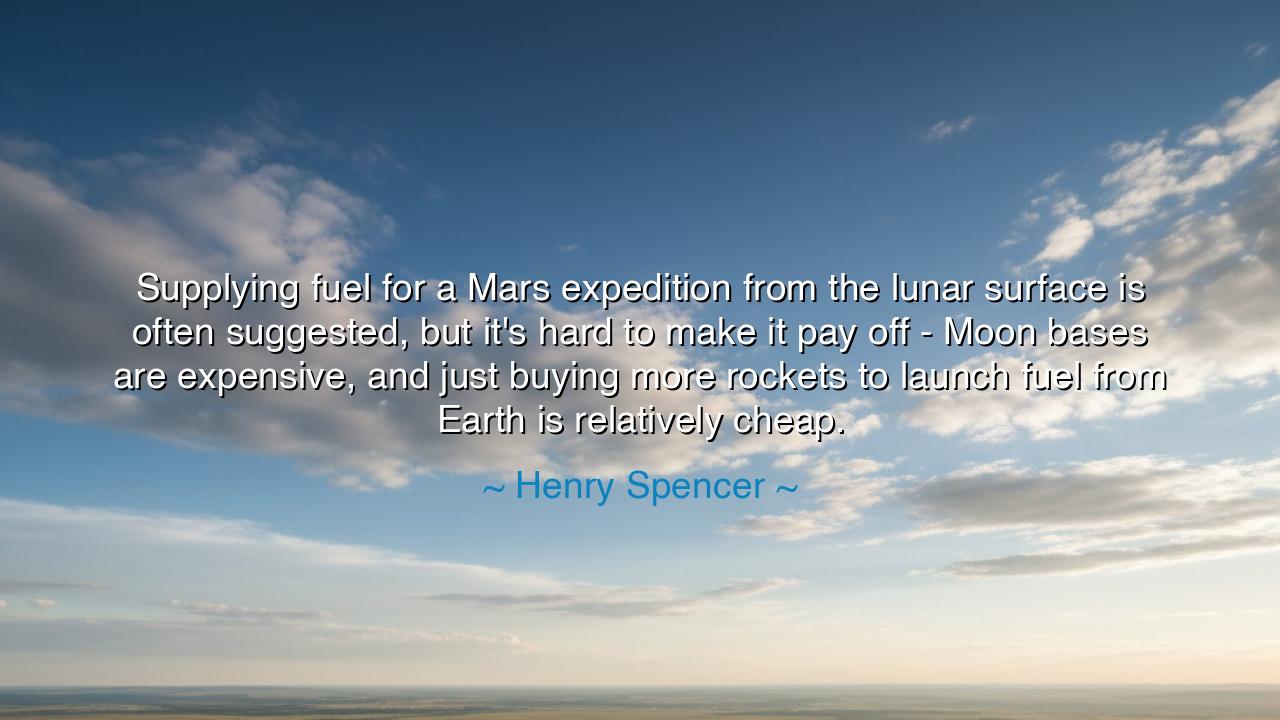
Supplying fuel for a Mars expedition from the lunar surface is
Supplying fuel for a Mars expedition from the lunar surface is often suggested, but it's hard to make it pay off - Moon bases are expensive, and just buying more rockets to launch fuel from Earth is relatively cheap.






In the boundless cosmos, there exists a dream that stirs the hearts of dreamers and visionaries: to reach the distant shores of Mars, to establish a new home amongst the stars, where mankind can spread its wings and flourish beyond the cradle of Earth. Yet, as we cast our gaze upon the heavens and dare to think of such magnificent feats, there comes the humbling realization that even the greatest of ambitions must wrestle with the cold hand of practicality. Henry Spencer, in his timeless wisdom, reminds us that though the Moon might serve as a stepping stone, the journey to Mars cannot be built on dreams alone. He speaks of the Moon bases, those imagined citadels of progress, where fuel might be harvested to fuel our voyage to Mars, but he warns that the cost of such a venture is heavy—an expense that demands the forbearance of the people.
What he reveals is a truth that echoes through the corridors of history: innovation is never just the pursuit of the grand idea, but the delicate balance of the grand and the feasible. The ancient Greeks once sought to master the stars, their philosophers dreaming of celestial beings and cosmic understanding. Yet they too were bound by the limitations of their time. And even when their theories soared to great heights, it was the builders, the engineers, the pragmatists who brought their visions down to the ground, crafting machines and tools that could take them just a step closer to the gods. So too, must we look to the Moon—not as a simple launchpad to the stars, but as a reminder that every grand design must find its foundation in what is possible, what is sustainable, and what the world can truly bear.
In the world of today, we see this struggle unfolding before us, as we grapple with the challenge of exploring the final frontier. The notion of launching fuel from the lunar surface—of establishing bases on the Moon to harvest resources for Mars—is an alluring one. It speaks to the boundless creativity of the human spirit, to the dream of harvesting the riches of other worlds. Yet, Spencer’s words strike at the heart of the matter: the cost of such ambitions may outweigh their reward. Moon bases, in all their complexity, are not small undertakings. They require vast resources, vast infrastructure, and an undying commitment to a future that is far from guaranteed. This is no mere science fiction; it is a hard, pragmatic challenge that faces us.
Consider the great voyages of the past. How many explorers set forth, fueled by a dream, but found that the cost of such a journey was too steep? The great navigators who sailed into unknown seas sought new lands, only to be defeated by the unrelenting costs of their expeditions. The Spanish explorers, in their quest to find new routes to the East, poured vast treasures into ships, only to find that the profit they sought was too distant, too illusive. In the end, it was not the grand designs that led to their success but the careful, measured steps that tempered their ambition. And so, Spencer’s lesson echoes across time: vision must always be tempered with reality.
What, then, is the lesson we must take from this truth? Ambition is noble, but it is not without its burdens. The dream of exploring the stars is the dream of all humanity, but it cannot be carried solely by our dreams. Practicality and wisdom must be the twin guides that lead us forward. In our own lives, we must learn to balance our soaring ideals with the grounded wisdom of understanding what is truly possible. Whether in our careers, our relationships, or our personal goals, we must recognize that the road to success is not always paved with the most extravagant visions, but with a steady, patient effort, focused on what can be achieved.
So, as we look to the heavens, let us remember that the path to the stars is a long one, and it must be built with small, deliberate steps. The dream of Mars is one we must cherish, but it is a dream that demands that we first master the earth beneath our feet. And as we work towards this future, we must remember that every great leap forward is made not by the size of our dreams, but by the wisdom of our choices. Thus, we must ask ourselves: What grand vision can we pursue, not in the fevered haste of ambition, but in the steady, deliberate pace of those who know that even the most distant stars must be reached one small step at a time?






AAdministratorAdministrator
Welcome, honored guests. Please leave a comment, we will respond soon